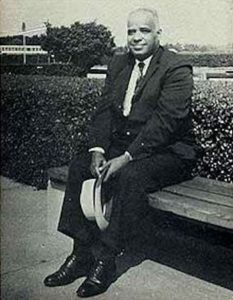
Waring Cuney
*Waring Cuney was born on this date in 1906. He was a Black poet and composer.
The son of Norris Wright Cuney II and Madge Louise Baker, William Waring Cuney was born in Washington, DC. His father, educated in Galveston, Texas, attended Howard University Law School and worked for the federal government until his death. His mother graduated from the Minor Normal School and taught in the Washington, DC, school system. William Waring Cuney graduated from D. C.’s Armstrong High School, then attended Howard University, Lincoln University (Pennsylvania), the New England Conservatory of Music in Boston, and the Conservatory in Rome.
After his formal voice training, Cuney decided not to pursue a career in singing but to focus his energies on his writing. Because of his interest in music and formal training, he adeptly incorporated the ballad and blues forms into his poetry. Cuney did not use his musical talents or training to perform professionally; however, he did write lyrics performed by others. For instance, Joshua White recorded some of his later protest poems on the album “Southern Exposure.”
Cuney and Langston Hughes were classmates and friends at Lincoln University. They were both active as poets in college, submitting works locally on campus and to magazines and contests nationally. Cuney also received recognition in the Opportunity Literary Contests of 1926 and 1927. He was awarded one-half of the first and second prizes in 1926 for the poem “No Images.” The following year, he received the second honorable mention in the Alexander Pushkin Section for the poem “A Traditional Marching Song” and the third honorable mention in the Poetry Category for “De Jail Blues Song.” When he was eighteen, Cuney wrote “No Images,” one of his trademark works. His poems were not collected until late in his career. The first collection, Puzzles, was not published until 1960, and the second collection, Storefront Church, was published in 1973.
His poems reflect racial concerns and themes delivered through folk speech, rhythms, and moods of the ghetto. He is the consummate artist who draws vivid sketches of characters with brevity and clarity of words. Cuney, as he was better known among his contemporaries, is often referred to either as one of the minor poets of the Harlem Renaissance or one of the “second echelon” poets of the New Negro Movement. However, among his contemporaries, he was considered one of the favorites of the Renaissance group.
Waring Cuney died on June 30, 1976.
Hayden, Lucy Kelly
“William Waring Cuney,” in Dictionary of Literary Biography. vol. 51
Afro-American Writers from the Harlem Renaissance to 1940
Edited by Trudier Harris (Detroit: Gale Research Inc., 1987).